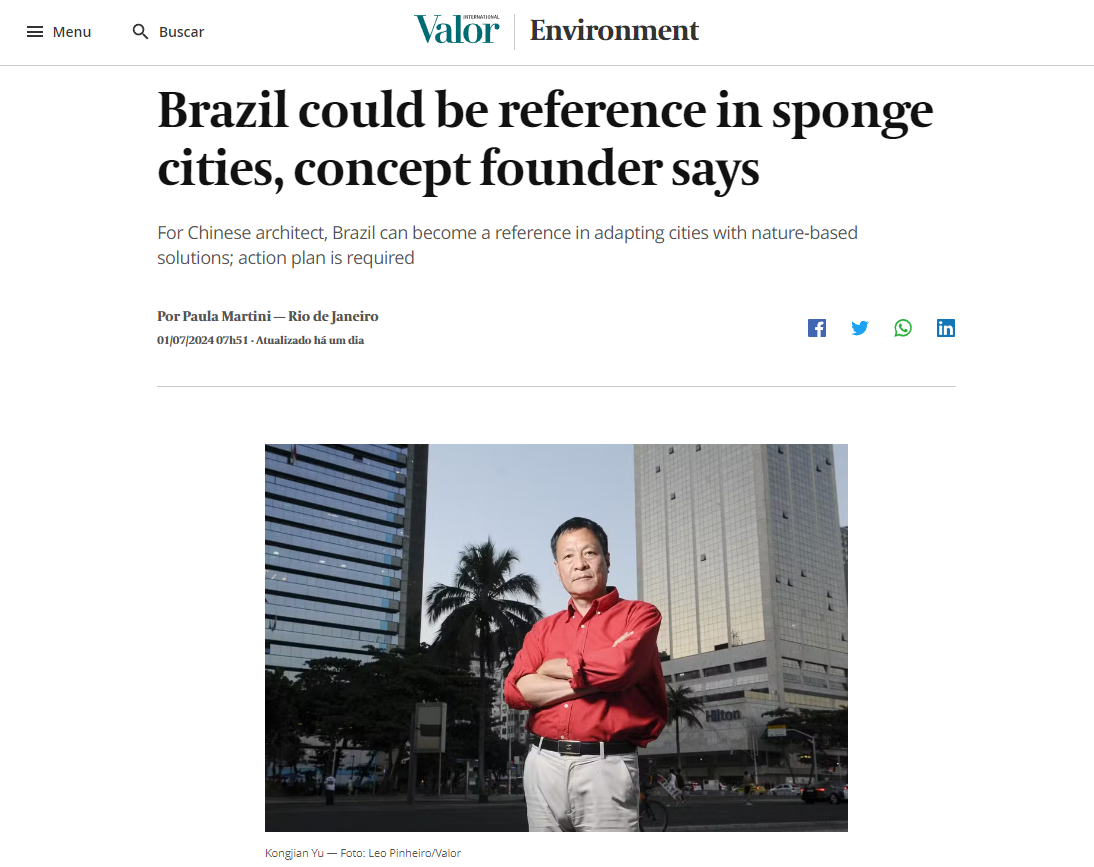Valor: Brazil could be reference in sponge cities, concept founder says

Brazil can become a reference in adapting cities with nature-based solutions but the country must develop an action plan and create partnerships so that projects can get off the drawing board. The recommendation was made by award-winning Chinese landscape architect Kongjian Yu, the creator of the sponge-city concept and a professor at the Peking University.
The system designed by Mr. Yu is based on the idea of keeping green areas both in the countryside and in cities to ensure time and room for rainwater to be absorbed by the soil.
The architect claims that floods should not be seen as an enemy of big cities but it is necessary to find nature-based solutions to reduce the devastating effect of storms and floods. “Concrete-made dams have failed and will continue to fail,” he said, mentioning the floods in Rio Grande do Sul.
“They will fail again as there is no man-made infrastructure that hasn’t failed. When that happens, we may have to face a major disaster,” he added.
Mr. Yu spoke to Valor last week when he attended a seminar by the Brazilian Development Bank (BNDES) on urban readjustment to mitigate extreme weather events, such as the floods that killed at least 177 people in Rio Grande do Sul.
He developed the concept of sponge cities based on his childhood experience in a village in China which was frequently affected by monsoon storms. Farmers in the area used ditches and lakes to store rainwater for dry seasons.
Everyday observation turned into academic work and has been part of China’s national plan since 2013, in addition to inspiring 250 projects of different scales in 10 countries. The architect said he sent his books and several letters to government authorities to present his ideas until his work was recognized. “I have finally convinced them that an ecological approach is the solution,” he emphasized.
For his second time in Brazil, Mr. Yu says a month ago he had his first meeting with Brazilian authorities and businesspeople interested in learning about his proposals, but partnerships in the country have not yet been formalized.
“This experience can make the country more resilient, more productive, and sustainable. Brazil could be a reference for the world. The whole world could learn from Brazilians.”
According to the architect, Rio Grande do Sul could become a sponge in three years if it chooses to adopt the model.
“With an assertive project, it would take three to six months to achieve a detailed action plan and another year or two to create the sponge system,” he said.
For him, Brazil has many advantages—the country is a young nation with a vast nature and a large population—and it would not be difficult to adapt projects designed for Chinese cities to the Brazilian reality, including the South Region.
“You [Brazilians] could use native species, you have the greatest biodiversity. You just need to analyze the topography,” he said, criticizing the lack of space for water absorption in Brazilian agriculture.
“With 10% of the land with water on farms, you would have a much more resilient landscape downstream. And properties’ value would increase substantially,” he claims.
However, he points out that can’t be done without a political effort. “By giving up 10% of land for water, owners would have to know whether there will be a policy of compensation or tax reduction. Planning and policy change would be required.”
